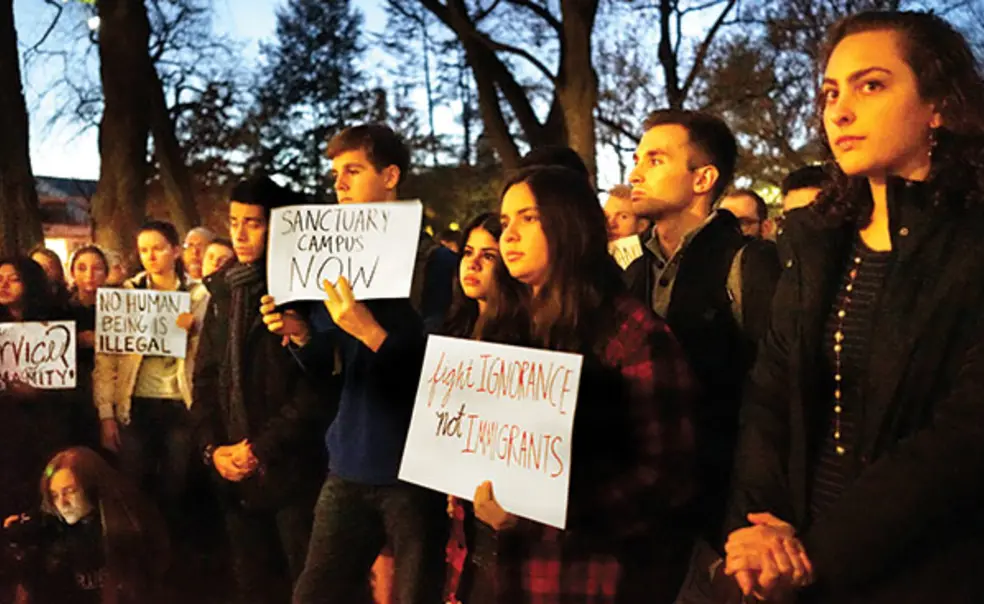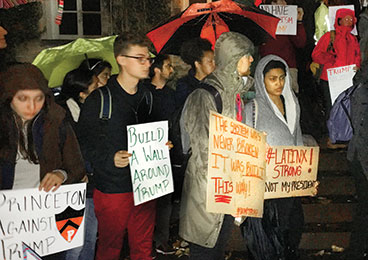Election Aftermath
Trump victory spurs student concerns; Eisgruber issues pledge of support
Princeton responded to the election of Donald Trump as president of the United States with student protests, faculty petitions, and administration statements, and some Republican students quietly expressed concerns that they could not speak freely about the result.
More than 2,000 people signed a petition sponsored by the DREAM Team, a student group that advocates for immigrant rights, and nearly 400 attended a Nov. 17 march through campus to demand that the University become a “sanctuary campus” to protect undocumented immigrants.
A primary focus of student unease was the future of undocumented students who have been protected by the Deferred Action for Childhood Arrivals (DACA) policy, an Obama- administration initiative that protects undocumented immigrants who arrived in the country as children. Trump said during the campaign that he might end the policy and deport students who had been protected by it.
President Eisgruber ’83 joined with more than 100 college presidents to urge continuation of the DACA policy and promised to take every legal step available to protect undocumented students, but rejected the idea of declaring Princeton a sanctuary campus. He said immigration lawyers have advised that the sanctuary-campus concept “has no basis in law, and that colleges and universities have no authority to exempt any part of their campuses from the nation’s immigration laws.”
“In a country that respects the rule of law, every person and every official, no matter what office he or she may hold, is subject to the law and must respect the rights of others,” Eisgruber continued. “Princeton University will invoke that principle in courts and elsewhere to protect the rights of its community and the individuals within it. But we jeopardize our ability to make those arguments effectively, and may even put our DACA students at greater risk, if we suggest that our campus is beyond the law’s reach.”
Sociology professor Miguel Centeno was working with Princeton residents to organize a network of safe houses that would be open to undocumented students if there were to be a raid on campus. “If it comes down to protecting a student who has done nothing wrong, but is undocumented, I will open my house and I will allow myself to join their fate,” Centeno said.
Students were organizing around other issues as well. The Women’s Center and the Program in Gender and Sexuality Studies was funding buses to take students to the Jan. 21 Women’s March on Washington in support of women’s rights and marginalized groups.
Muslim students met to develop ideas to combat the bigotry — and in some cases, violence — experienced by Muslims nationwide after the election. “We are fighting for something as simple as making sure that we, our families, our friends, undocumented migrants, and others from minority groups can live safely in America — [both] Muslims and non-Muslims,” said Robia Amjad ’18, co-president of Muslim Advocates for Social Justice and Individual Dignity, a student group.
Graduate Student Government president Mircea Davidescu said some international students fear that the Trump administration will change or repeal visa programs needed to find employment in the United States after graduation. International students make up about 42 percent of the graduate student body. Some international undergraduates who are eligible for citizenship have asked for advice on how to pursue that now, said Khristina Gonzalez, associate dean of the college and director of programs for access and inclusion.
Gonzalez said the University has encouraged groups of students to come together while reaching out to students with the message: “How are you feeling? How can we be there to support you? Do you need help with legal questions?”
As examples, she cited a conversation in Butler College, hosted by Nicole Shelton, head of the college, about the election and “how we move on from here”; a workshop sponsored by the Davis International Center and the Office of Religious Life with a lawyer experienced in immigration issues; and a series of events called “Community Mindfulness in Action” that offered both practical legal information and the opportunity to “reflect where we are and to de-stress.”
READ MORE: After the Election, the Campus Responds
Concern has not been limited to Trump’s critics. English professor Jeff Nunokawa, head of Rockefeller College, described having a “very sobering” conversation with a group of conservative students. He believed they were not open to sharing or admitting their views on Trump because “they felt a lot of pressure on campus,” and worried that others might assume they were racist because of their support for the president-elect, he said.
A primary issue “is people misunderstanding conservatism even more than they already do and assuming that being conservative means supporting Trump,” said Sofia Gallo ’17, vice president of the Princeton College Republicans. That, she said, “will make it harder to have conversations about politics.”













1 Response
Jonathan Denham ’85
9 Years Ago‘Sanctuary’ Stance
An initial reaction to President Eisgruber ’83’s message re the Deferred Action for Childhood Arrivals (DACA) policy and sanctuary campuses (On the Campus, Jan. 11), with two acknowledgments first: 1) Care and caution from the University’s administration are certainly understandable, given the tremendous uncertainty swirling around these subjects; and 2) I am not an attorney.
I am, however, a Princeton alum who considers himself a progressive, and also the co-owner of a small business with some direct experience with immigration/employment regulations, i.e., the “law.” So I must say that I’m underwhelmed and feeling ready to be disappointed by the University’s stance on this. I’ll accept the analysis by the University’s advisers that there is currently and historically no basis in the law for sanctuary campuses, but I think that is clearly a rather narrow and tenuous position. For many decades, there was no basis in the law of the United States for voting rights for African Americans or women.
President Eisgruber has strongly stated Princeton’s embrace of the rule of law; I support that position broadly, deeply, but with limits. Beyond those limits, there is a legitimate role, legally and morally, for civil disobedience. If policies and events come to demand it, I hope the University will not rule out the option of itself undertaking civil disobedience. As it says on our new medallion in front of Nassau Hall, “In the nation’s service and the service of humanity.”